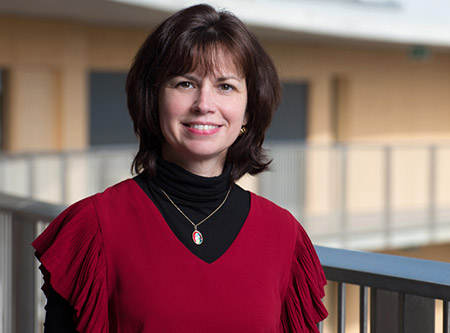Portrait
Estelle Doudet arrived at UNIL in 2018 as a full professor in the Faculty of Arts. She specialises in the literature of France as well as the areas now known as Switzerland and Belgium, over the long period that stretches from the 14th to the 16th centuries. She has been familiar with the university since 2001, having started out as a researcher at UNIL, and views her role as a member of the Rectorate as supporting researchers, whose concerns she shares. She herself has had to adjust the pace of her research to her new mission, which is not self-evident for someone who is still actively involved in academic work and, at the age of 46, still a long way from retirement. "It’s also important to support an institution that welcomes us with such generosity, and I appreciate the opportunity given to me by the Rector, Frédéric Herman; it is an honour to be able to support my colleagues, and especially the next generation of researchers."
A proper department devoted to supporting research has not happened overnight at UNIL. It was the brainchild of the former vice-rector, François Bussy, who asked Estelle Doudet to get involved in the initiative in the winter of 2021. One of the first tangible developments was the appointment of a head of department, Julian Randall. "It is about supporting researchers either by responding to them quickly, or pointing them towards the right people. Resource people of this kind exist in both the faculties and other departments, but it’s essential to use their contributions coherently, in a clearly identified, clearly visible network, which is committed to supporting research," explains the vice-rector. Academics all face legal, administrative, ethical and legal issues but have different needs and are not all equally well equipped to respond to them.
Estelle Doudet is also responsible for three other entities. The Graduate Campus supports and advises all PhD students during and after their thesis work: "I felt it was essential to include it to make it clear that for us, the next generation is not only students, but also researchers, including those who will go on to work in business, the public authorities or elsewhere; even for those who subsequently change career, research provides an overall framework that teaches you to look at the world in a certain way." The PACTT (Powering Academia-Industry Collaborations and Technology Transfer) supports the transfer of discoveries to the public domain, in health and a range of other areas. It works closely with Lausanne University Hospital (CHUV) but is also available to individuals in any faculty, who want to promote the results of their research to a wider audience.
Finally, the ColLaboratoire "is an entity that supports participatory research and has a strong international network, particularly in French-speaking universities, which stimulates ideas around innovative methodologies and research topics," explains Estelle Doudet. "We are positioning UNIL as a place of invention, which explores other ways of producing knowledge, with people who research in different ways and partners who are not always academics."
As a specialist in a “media turning point" that saw writers, artists and men in power, but also ordinary citizens, appropriate different ways of communicating to the public (for example, through the theatre, including in Calvinist Geneva) to "influence opinion, criticise governments, and try to get their ideas across in a society marked by pandemics and the wars of religion," Estelle Doudet works, among other things, on the humanist theologian Théodore de Bèze, one of the founding figures of our university... an allusion we could not ignore to end this profile of a vice-rector who cares about her institution.


